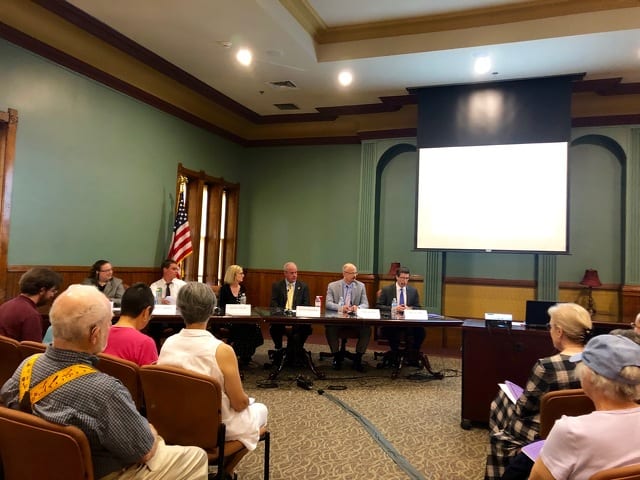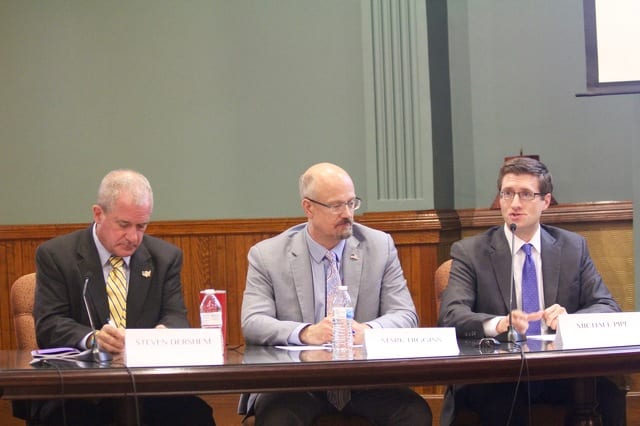
no description

no description
More than 150 people crowded into the Centre County Courthouse Annex on Thursday night, many sharing their own experiences with the mental health system.
Over the course of more than two and a half hours, their stories differed, but they all carried a common message: Change is needed.
The community conversation on mental health services was hosted by the Centre County commissioners and comes after Osaze Osagie was shot and killed by State College police in March. The death of Osagie, a 29-year-old black man who was diagnosed with autism and struggled with schizophrenia, has brought into focus concerns about mental health services, race and police interactions.
Commissioner Michael Pipe said Thursday’s conversation is just the first as the county looks at what it can do to improve mental health services, and he noted that the task force being brought together this summer by State College Borough will be examining all of the issues raised by Osagie’s death.
‘Many of you have had pain, frustration, and anger… over the tragic death of Osaze Osagie,’ Pipe said. ‘There are no words to describe that pain. We’re going to hear that tonight and we want to hear that. The only way we’re going to see positive change, the only way we’re going to find a bridge into an improved mental health system, an improved relationship in so many ways in our community, is if people are honest. We want you to be honest.’
Several speakers urged that while discussions around mental health continue, issues of race not be forgotten.
‘We really need to talk about race. We talked about mental illness, but there is the intersection of race and mental illness,’ said Lorraine Jones. ‘When we talk about building this task force and working on these issues, State College tends to have a short-term memory. They’ll do it for a little while and then all of a sudden they kind of forget. I want to make sure we do not forget about that. We need to be committed to work on these issues, committed to courageous conversations about race.’
The evening was designed to give residents an overview of mental health services and laws and to allow community members to share their perspectives and suggestions.
Kellie Wayda, director of the Division of Western Operations, and Scott Liddick, community program manager, explained how the Pennsylvania Office of Mental Health and Substance Abuse Services works with counties and other agencies to provide mental health services in communities. The office’s overall responsibilities are to develop, monitor and evaluate programs and services in collaboration with counties, individuals, families, advocates and other stakeholders.
A 1966 law established county-based behavioral health services, and a state plan mandates what services must be offered to eligible individuals. In addition to developing programs, OMHSAS licenses and provides oversight for facilities and acts as a conduit between the community and the state.
At the local level, Centre County’s Office of Mental Health administers and arranges contracts for state-mandated programs and other services that have been developed.
‘We have to know about every individual who wants to come through our door, who is in need of assistance and services,’ said Natalie Corman, human services administrator. ‘Beyond that we have an obligation to do the services the state plan has told us we have to do, but then we’ve listened to our community, we’ve listened to individuals over the years to develop and enhance services.’
Currently, the county serves 888 individuals, the majority of whom are in some form of case management. Corman explained that the county contracts with Can Help to offer mobile, phone and walk-in crisis intervention services. Can Help also provides ‘delegate responsibilities’ for ‘302’ warrants for involuntary hospitalization, with a role in authorizing the warrant and arranging the logistics of the commitment.
The county is currently working on a contract for a new walk-in center that would provide crisis assessment services, as well.
Whether someone has experienced hospitalization or is just seeking to be linked to services for the first time, the county provides intake services ‘to help people figure out where to go and how to get help,’ Corman said. From there they can receive a variety of outpatient services or residential programs through different providers. The county offers partial hospitalization for children only, while adults are eligible for psychiatric rehabilitation.
‘Psych rehab is about the whole person and recognizing all parts of an individual’s life and what they need to be supported,’ Corman said. ‘It’s education, employment, socialization… It’s all the different ways we want to support the individual.’
For long-term inpatient care, the state has six hospitals, with Centre County assigned to Danville State Hospital. The county is allocated just seven of the 161 beds there.
‘Someone Is Going to Get Hurt’
For Mina Yindra, of Boggs Township, having so few spaces available at Danville has become a great concern. Her son is diagnosed as paranoid-schizophrenic and has become increasingly violent. Since he moved to the area, county services have tried to help, but his case manager and doctors said he needs long-term hospitalization.
The wait for a room at Danville, though, is at least six months, Yindra said. Her son, meanwhile, isn’t eligible for residential programs because of his behavior so is now living on his own in a boarding house.
‘He’s continued to get worse… If you release him back into the community I can guarantee you someone is going to get hurt, whether it be him or someone else,’ she said. ‘I’m frustrated because I don’t want anybody to get hurt.’
Cheryl Sharpe, of Spring Township, is concerned for her son as well, but for different reasons. He is diagnosed with autism and has had interactions with township police in the past that have been fine. Now he is living in State College, and Sharpe worries that if there is an encounter with police who do not know him, he could meet the same fate as Osagie, who was a friend of her son’s.
‘My question is what are we going to do to prevent another tragedy like that? I worry it’s going to be my son,’ Sharpe said.
As several others did, Anya Lazero asked whether professionals trained in de-escalation could accompany police serving 302 warrants.
Corman said that the county has been looking first at other Pennsylvania counties and found that the practice largely is not in use, so now they are looking at models outside the state.
‘It’s really been our first journey to see what that really looks like,’ Corman said. ‘Across the commonwealth, it is not a practice that occurs, so it’s really taking the time to go beyond Pennsylvania. We first needed to look at Pennsylvania because of our act and our laws. We can then take that next step to look at other jurisdictions and what it needs. We have to look at what that means in terms of staff and education, experience, all those things a person would need.’
Pipe added that more officers are now taking crisis intervention training.
‘We’ve had many officers who have gone through that program who have successfully de-escalated, so we do know the program works,’ he said. ‘I know there are concerns, and this is my hope: that a year from now we look back on the task force and the community coming together to improve the relationship between mental health and law enforcement that we’ll actually see positive effects.’
Lazero brought another perspective to the conversation as well. For two years she lived in community residential rehab, a supportive environment for people with mental health issues. It gave her the skills she needed to live independently and she felt fortunate for the opportunity, but she said the discussion of when she would transition out began almost as soon as she arrived.
With so few spaces available in CRR, Lazero said the county should look at offering both transitional and more permanent spaces.
‘I ask you on behalf of my friends to increase the number of supportive living arrangements and better transitional support,’ she said. ‘We need to have each other’s backs… Our county should be like a family, not a broken family.’
‘A Broken System’
Vernon Davis has seen what he views as a broken system through the lens of his college-graduate son’s struggles and the difficulties families face in getting help for their loved ones.
Davis said his son is suffering, but is intelligent and knows to tell doctors what they want to hear. Health privacy laws prevent Davis and his wife from fully participating in their son’s care, he said.
‘As parents, we want to work in concert with the physicians, psychologists and psychiatrists,’ he said. ‘If he goes to the hospital and says ‘I don’t want them to know anything,’ they will tell us absolutely nothing… There has to be some change in that law. It works against the parents and those that love the individual.’
Davis also said that mental health facilities and services are lacking, which in turn is leading to more people who need help ending up incarcerated.
‘You know where they can probably get the most help is where they don’t need to go. That’s Rockview,’ he said. ‘We’ve traded incarceration for mental health. At Rockview they have an entire ward of people suffering with mental health that should not be in there. We’ve done these people a disservice… They wind up incarcerated somewhere and there they stay, drugged and out of their mind for the rest of their life. I refuse to let that be my son’s demise.
‘We have a broken system. It’s going to take people from all over, from all aspects looking at this to combat it. The way we’re treating people with mental health [issues] is terrible. They need a voice.’

Vernon Davis, of State College, speaks during a community conversation on mental health services on June 27 in Bellefonte. Photo by Geoff Rushton/StateCollege.com
Chris Potalivo said he and his wife have seen similar issues with their daughter who has been in crisis.
‘We’re Great Britain in the 1700s. We don’t know what to do with people that are having problems. We throw them in jail,’ he said.
Potalivo said his daughter has struggled with mental health and substance abuse issues. After she was released from a treatment program, she left with a bag full of pills, but because of privacy laws Potalivo and his wife could not be told what they were or the correct dosage. There was also no transition home in Centre County for her to go.
In the midst of a crisis, Potalivo’s daughter was taken to the hospital, with the help of police who Potalivo said were helpful and professional. She was released from the emergency room, however, at 1 a.m., and eight hours later was arrested. She ended up spending four months in jail.
Ron Dotts, of Bellefonte, has also seen the issue of someone he loves being released while still in crisis, though with a result that was even more tragic.
On May 4, his grandson Josh, who was diagnosed with schizophrenia, believed four men were inside the house and trying to kill him. He dove out a second floor window and had to be talked down from a roof with the help of police and EMS.
He was taken the hospital and his mother pleaded with doctors to have him involuntarily hospitalized. Dotts said they were unable to do so and eight hours later released him without telling anyone. When Josh’s mother learned he had been released, she contacted police who found him, then let him go.
Two hours later Josh went to his mother’s home and took his own life.
‘What is the system we have that allowed that to happen? We have a broken system and we need to fix this,’ Dotts said.

Chris Potalivo speaks during a community conversation on mental health services on June 27 in Bellefonte. Photo by Geoff Rushton/StateCollege.com
Finding Solutions
Centre County’s budget for mental health services is just over $4 million, with most of that money coming from the state. Dotts suggested a closer look at how that money is allocated and whether more can be put toward direct services.
Geoff Landers-Nolan, a licensed professional counselor from Pine Grove Mills, said the gaps in mental health care are often about a lack of funding.
‘What’s so important about the budget piece is that budgets look bloodless, and they are not. Budgets contain the power to save or destroy lives,’ he said. ‘…The people at this table are the ones who have those connections, who have those relationships [to advocate for more funding]. We find safety as human beings in relationships… please use your relationships to increase the funding, increase the services, increase the support.’
Landers-Nolan, who worked for Can Help from 2012 to 2013, said the issue of race as it relates to mental health care should not be overlooked and training for cultural competency is needed.
‘There are mental health professionals who are not culturally competent and who do not care to be, and that is a problem,’ he said.
He added that the county also needs to find why the number of 302 warrants served by police has skyrocketed the past two years. In his report on the investigation into Osagie’s death, which exonerated the police officers involved and examined issues with the mental health system, District Attorney Bernie Cantorna wrote that in 2017 56 mental health warrants were served. In 2018 it climbed to 304 and was on pace to match or exceed that this year.
‘That does not happen by accident. Something changed,’ Landers-Nolan said. ‘I’m familiar with the 302 process and I cannot explain what happened… That is critical to not just what is happening in the mental health system but also to what the DA is saying, that our police are overburdened in terms of their contributions to the mental health system.’
At the conclusion of the meeting, which went about 90 minutes past its scheduled 8:30 p.m. end time, commissioners said the conversation was a first step and that another would be scheduled in the coming months.
‘We heard from many people about the system we’d like to create, about the system we’d like to improve,’ Pipe said. ‘So the work is going to be continuing.’
Commissioner Mark Higgins said some of the suggestions made during the meeting could potentially be implemented over the next year by the county, but many would require collaboration with state offices, agencies and other stakeholders.
Commissioner Steve Dershem said that the system is imperfect, but that Centre County is fortunate to have more resources than some other areas. The challenge is to take a look at all aspects and determine the best ways to make improvements.
‘The thing I want to remind everybody about… is it’s easy to say ‘Yeah let’s just put money into a problem.’ I think we need to look at the best place that those dollars could be spent,’ Dershem said. ‘We have to look at the needs of a variety of different areas… There were a lot of thought-provoking issues tonight raised and I think it’s an opportunity for us to have some really good conversations and find some solutions.’
Higgins added that there were ‘a lot of lived experience, a lot of powerful stories,’ shared throughout the meeting that would stick with him.
‘I’m going to have trouble falling asleep tonight,’ he said.

Centre County Commissioners, from left, Steve Dershem, Mark Higgins and Michael Pipe hosted a community conversation on mental health services on June 27 in Bellefonte. Photo by Geoff Rushton/StateCollege.com
Watch the meeting in its entirety below:
Receive all the latest news and events right to your inbox.

80% of consumers turn to directories with reviews to find a local business.